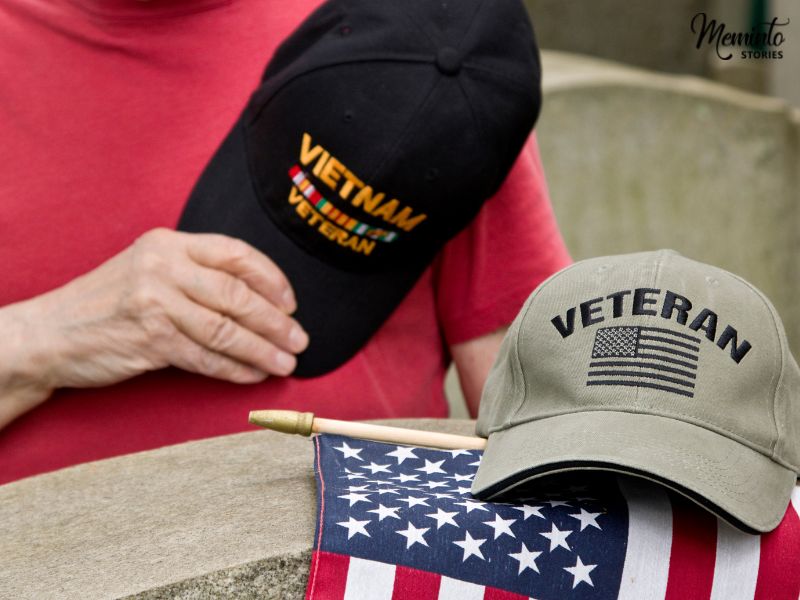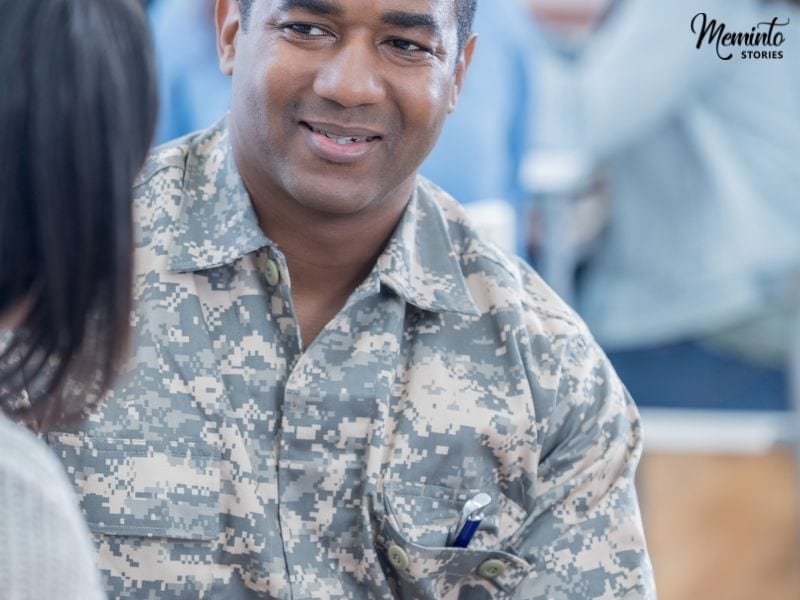Asking US military veterans about their experiences helps you capture the essence of his or her military experience and assists you in creating a lasting record of their stories. Questions can cover their service, deployments, friendships, family life, and transition to civilian life.
Recording the experiences of military veterans can be a powerful tool for capturing their experiences, honoring those who serve, and educating future generations about obstacles and accomplishments overcome by those who served. Whether you’re a family member, friend, or historian, getting them on record may be as easy as asking the right questions.
In this article, you’ll find 100 thought-provoking questions that will guide you on how to get stories to document the life story of veterans through each period of their journey, from the early days in service to deployments, good friends and family life, and transition back to civilian life.
Key Takeaways
- Asking these questions is an excellent opportunity for US military veterans to describe their experiences and keep these stories alive and documented.
- The questions reflect many different areas: their time in service, deployments, good times and friendships, family life, or transition to civilian life.
- Documenting their stories honors veterans, enlightens coming generations, and puts on record the challenges and achievements of those serving in the armed forces.
- You can use Meminto as a tool to create a memory book based on these documented stories.
100 Questions to Ask US Military Veterans to Document Their Stories

If you want to document the stories of US military veterans on their experiences during or after service, here are some questions to help you get started:
Early Days in the Service
- When and why did you join the military?
- How did you feel on the day you enlisted or got drafted?
- How did you tell your family and friends you were joining the military?
- What did you think of military life first off?
- How was basic training for you?
- What was your first assignment or duty station?
- Who do you remember as some of the first people you met in the service, and what can you tell me about them?
- What challenges did you face in the beginning?
- What were some of the skills you learned during initial training?
- How did your expectations of military life compare with reality?
- What was your day-to-day life like in the early days of your service?
- How did you adjust to the discipline and structure of military life?
- What are some of the memorable moments from your first few months in the military?
- How did you keep in touch with your family and friends back home?
- What is the best piece of advice you would offer someone just starting out in the military?
- What was the most difficult exercise or problem that you personally had to face in the early stages?
- What were some of the ways in which you handled the stress or pressure during initial training?
- What were some of your initial goals or expectations regarding your military career?
- What were your feelings about the speed and intensity of training?
- What support was given from your colleagues or superiors?
- How did you adjust to the uniform and other aspects of military dress?
Deployment
- How did you communicate the deployment to your loved ones?
- What was your first thought when you were told you were deploying?
- How did you get ready for this deployment?
- What were some of your key duties during the deployment?
- How did you keep up with family and friends while you were gone?
- What are some of the more memorable experiences from your deployment?
- How did you cope with being away from home?
- What were some of the issues you had while you were deployed?
- How did you and your fellow service members support one another?
- If you did more than one deployment, how were they different from each other, and how did you change over time?
- How did those deployment experiences change you?
- What were the living conditions like where you were deployed?
- How did you use your free time while you were deployed?
- What was the hardest part about being deployed?
- Did you have any prominent contact with locals or local communities?
- How did you cope with the difficulties of a language or cultural nature during your deployment?
- What support did your unit or command give you while being forward deployed?
- Were there any deployment challenges or surprises that you did not expect?
- How were you feeling as you returned home from deployment?
- If you were sent overseas for military service, how did you break the news to your family and friends that you were being deployed?
- How did you stay in touch with them while away?
Friendships/Fun Memories
- Who were some of your closest military friends?
- What did you and your friends do to pass the time?
- What do you remember as one of the most humorous moments?
- What were some of your favorite pastimes or hobbies while in the service?
- Can you share a memorable story involving your friends?
- What was a typical weekend like for you and your buddies?
- Did you or any of your friends have traditions or rituals?
- What games or sports did you play together?
- What did you do during special times of the year, like birthdays or holidays?
- What is the best prank that you have either seen or been a part of?
- How did your friendships help you get through hard times?
- Did you and some of your friends ever travel together during leave?
- Where did you like hanging out with your friends?
- How did you keep in touch with your friends when you left the service?
- Describe a situation when your friends really came through for you.
- What is one of the memorable meals you shared with your friends?
- What were some of the differences between military and civilian friendships?
- Did you or some of your close friends have any inside jokes or special nicknames for each other?
- What is your favorite or most cherished memory of a friend no longer with you?
- How did the friendships you created tend to impact your overall military experience?
Transitioning to Civilian Life
- What was the hardest part about adjusting to civilian life after your service?
- What did you miss most about being in the military?
- How did the military experience shape your approach towards everyday living?
- What support did you find most helpful during your transition?
- Did you retain any habits or routines from the military?
- What were your views of civilian life directly after the military service? How had they changed?
- What struggles did you have finding work or starting a new career?
- How did family and friends help you through the transition process?
- What lessons would you pass on to other veterans transitioning into civilian life?
- What do you feel was a surprising or unanticipated aspect of civilian life?
- How did you keep in touch with other veterans after leaving the military?
- Which resources or organizations were most helpful to you during your transition?
- How did you adjust to the change in your daily routine after the military?
- Which of the skills learnt during your military service have proven most useful in civilian life?
- How did you help yourself cope emotionally and mentally throughout this transition period?
- How did you feel on your last day in the military?
- What was the first thing you did when you came out of the service?
- What was your experience with health care and other veteran services when you left the military?
Marriage, Partnerships, and Families
- How did you meet your partner or your spouse?
- How did your military service affect your relationship?
- How did you stay in touch with your husband or wife while you were deployed?
- What challenges have you encountered in trying to keep up your relationship while in service?
- How did you maintain contact with your family over such long distances?
- How was it reuniting with your family after deployment?
- How did the partner get supportive while you were in your service?
- What would your critical advice be for military couples?
- How did you balance military duties with family life?
- How did your children feel about your deployments?
- What activities did you do as a family when you were home?
- How did your family handle moving very often from one place to another?
- What traditions or routines kept your family close?
- How would your experience in the military influence your parenting and/or child-rearing?
- How did your partner manage the household during your absence?
- What was your family’s involvement in your military service?
- How did you celebrate milestones or special occasions with your family?
- What support systems did your family use or have access to while you were serving?
- How did military service shape your family values?
- What are some of your favorite family memories from your time in the military?
How to Create a Memory Book to Document a US Military Veteran’s Story With Meminto
With the question prompts above, you can create a memory book to document the answers or stories for others to learn from. To help you streamline this process, you can use Meminto to create the memory book.
Here’s a step-by-step guide on how you can use Meminto to create a memory book for documenting the stories of a US military veteran:
- Go to https://meminto.com/product/life-book/ and click “Get Started.”
- You can buy the book for yourself or someone else by choosing either the “I will” or “Someone else will” option.
- Pick the number of pages you want, and choose if you want extra or digital copies. When you’re finished, click “Add to Cart.”
- Enter your shipping address and payment method. If you have a promo code, apply it.
- Confirm your order and track it from the checkout page.
- Look for a confirmation email and an activation code. Copy the code and visit https://memin.to/register.
- Enter your details, the activation code, and a password. Click “Sign up for Meminto” to begin writing your story.
- Select your preferred language (German or English) and the day you want to receive weekly questions. Then click “Save Changes.”
- Choose how you want your book’s text and category to align.
- Adjust the book to meet your needs.
- Watch the video below to learn more about using the Meminto app.
You are currently viewing a placeholder content from YouTube. To access the actual content, click the button below. Please note that doing so will share data with third-party providers.
More Information
Conclusion
By documenting their stories, military veterans from the US will not only preserve a part of their personal history but contribute much to a greater understanding of the varying sacrifices and experiences of all those who have served. This article includes 100 questions covering everything from early days in service to details of the often-difficult transition back to civilian life that can help capture these memories.
Tools like Meminto can be used to create a lasting tribute, showing respect and thanks to veterans and their stories, which should not be forgotten but passed down for generations. Such questions can help everyone—family, friends, historians—who wants to collect insights into painting the full picture about a veteran’s journey to make his legacy a part of history.



















